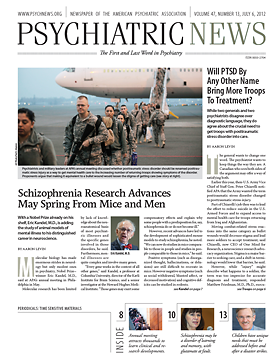Intrauterine antipsychotic exposure may significantly affect neuromotor performance in 6-month-old infants.
Researchers at Emory University reported online April 2 in the Archives of General Psychiatry the results of a 1999 through 2008 prospective controlled study of 309 mother-infant pairs. Examiners masked to maternal-infant exposure status administered a standardized neuromotor examination (the Infant Neurological International Battery, INFANIB), which tests posture, tone, reflexes, and motor skills. Infants prenatally exposed to antipsychotics scored significantly lower than those with antidepressant or no psychotropic exposure.
Only 19 percent of the infants prenatally exposed to an antipsychotic demonstrated normal neuromotor performance. The abnormal INFANIB scores were also significantly associated with maternal psychiatric history, including depression, psychosis, and overall severity/chronicity of mental health disorders.
“Taken together, results from the study raise concerns about the potential impact of both prenatal exposure and maternal psychiatric illness,” wrote lead author Katrina Johnson, Ph.D., a clinical psychologist in the Department of Psychiatry and Behavioral Sciences at Emory University, and her colleagues. They said their novel data provide an important contribution given the lack of published human data on this topic and the frequency of psychiatric illness requiring pharmacotherapy during pregnancy.
“It is unknown whether the observed deficits are transient or reflect early evidence of a persistent disruption in neuromotor function,” they said. “Future investigations are warranted to disentangle the relative contribution of antipsychotic medications, maternal mental illness, concomitant medications, and the broader psychosocial context in the developmental trajectory of high-risk infants.”
Johnson and her colleagues proposed a mechanism that might explain the abnormalities they observed: “Although antipsychotics differ greatly in their in vivo pharmacodynamic profiles, they uniformly antagonize, to varying degrees, postsynaptic dopamine D2 receptors. … Recognizing that recent neuroimaging data indicate that dopamine is phasically released during motor learning, presumably serving to focus the learner and reinforce newly learned memory patterns, the potential impact of fetal exposure to agents affecting dopaminergic systems on later neuromotor performance warrants careful scrutiny.”
The researchers called for further research in this area, including discussion of the broader psychosocial context of the developmental trajectory of high-risk infants, but noted that—pending such studies—an additional level of clinical scrutiny in medication selection, treatment planning, and risk/benefit discussion for women with illnesses who may warrant antipsychotic pharmacotherapy during gestation are clearly warranted.
The study was supported by a NARSAD Young Investigator Grant Award, as well as grants from the Emory University Silvio O. Conte Center for the Neurobiology of Mental Disease, the Specialized Center of Research on Sex and Gender Effects, and the National Institute of Mental Health.


